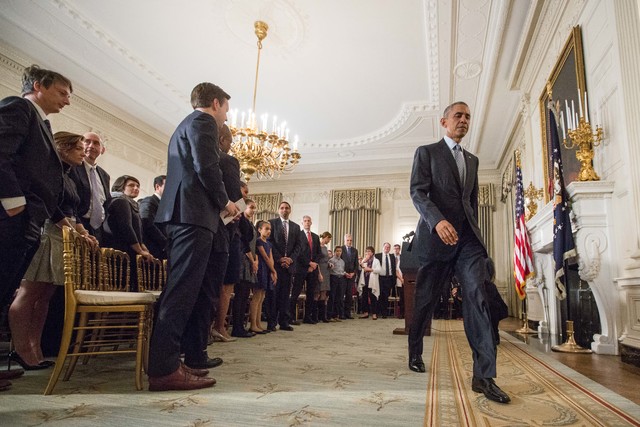WASHINGTO — President Barack Obama is accusing White House hopefuls of concocting “half-baked” ideas for solving the crisis in Syria, appearing to even dismiss his former Secretary of State Hillary Rodham Clinton’s call for a no-fly zone before later clarifying
WASHINGTO — President Barack Obama is accusing White House hopefuls of concocting “half-baked” ideas for solving the crisis in Syria, appearing to even dismiss his former Secretary of State Hillary Rodham Clinton’s call for a no-fly zone before later clarifying his view of the Democratic front-runner.
The idea of a no-fly zone — a region of Syria that the United States would protect from bombing to create a safe corridor for refugees — has emerged as a favorite option for Democratic and Republican candidates. It’s a plan that allows them to stake out a more aggressive military posture than Obama, while stopping short of the kind of large-scale combat troop deployments the U.S. engaged in for years in Iraq and Afghanistan — and of which voters have wearied.
Obama, who opposes such a move, said Friday that he’d like critics of his Syria policies to be asked, “Specifically, precisely, what exactly would you do?” He told a White House news conference, “Typically, what you get is a bunch of mumbo jumbo.”
Pressed about whether his comments were directed at Clinton, Obama said he didn’t think her approach to international issues was “half-baked.” But he pointedly added, “There’s a difference between running for president and being president.”
“If and when she’s president, then she’ll make those judgments,” he said of Clinton. “And she’s been there enough that she knows that these are tough calls.”
The president’s comments came amid escalating concerns about the crisis in Syria, where a 4½-year civil war has killed more than 250,000 people and left the country a breeding ground for terror groups, including the Islamic State. Russia began launching airstrikes this week under the auspices of defeating the Islamic State, though Obama on Friday accused Moscow of being more interested in bolstering Syrian President Bashar Assad, a Kremlin ally.
The next U.S. president is all but certain to inherit the mess in Syria, leaving candidates in both parties scrambling to define their approaches.
Clinton, in one of her few public breaks with Obama on policy since launching her campaign, said Thursday that if she were president, she would be calling for a no-fly zone and other action to address the crisis.
“I personally would be advocating now for a no-fly zone and humanitarian corridors to try to stop the carnage on the ground and from the air,” Clinton said in an interview with WHDH-TV in Boston.
Clinton was among the more hawkish members of Obama’s national security team during his first term and has long touted her early support for arming moderate Syrian rebels to fight the Assad government. Obama reluctantly backed a proposal to equip opposition forces last year but has used the program’s failure to suggest his initial wariness was right all along.
Clinton’s chief rival, Vermont Sen. Bernie Sanders, said Saturday he opposes a unilateral American no-fly zone in Syria, arguing that it could pull the U.S. into the Syrian civil war and “lead to a never-ending U.S. entanglement in that region.”
Sanders said he supports Obama’s efforts to fight the Islamic State group in Syria and efforts by Syrian rebels to overthrow Assad, but his opposition puts him at odds with Clinton.
Ohio Gov. John Kasich, a Republican candidate, said Friday that he, too, would support using U.S. air cover to provide refuge for Syrians trying to flee the war.
Other Republican candidates have previously backed a no-fly zone, including former Florida Gov. Jeb Bush, Florida Sen. Marco Rubio, and former business executive Carly Fiorina.
However, Kentucky Sen. Rand Paul, who generally favors limiting American influence overseas, has argued that bombing Assad’s forces would have only strengthened the Islamic State. And Donald Trump, the billionaire businessman who leads the GOP field, said that if Russia wants to take the lead in fighting the Islamic State, the U.S. should let it.
Declaring a no-fly zone over Syria would in effect put the U.S. directly at war with the Syrian government, since it likely would require bombing Syrian air defenses to keep the skies safe for the U.S. combat aircraft enforcing the zone. Even as Obama has called for Assad’s ouster, he has not backed any direct U.S. military action against the government.
Based on past U.S. actions, a no-fly zone would be established by first launching a significant attack not only on Syrian government air defenses but also on the facilities that support those defenses. A substantial number of U.S. combat aircraft would then have to patrol the skies continuously to enforce the exclusion zone.
Such action would also likely require stationing more U.S. refueling aircraft in the area, as well as more search-and-rescue assets near Syria as a precaution if a U.S. pilot got shot down.
The White House has long resisted calls for a no-fly zone, with officials saying it raises problematic logistical questions about how it would be enforced and what kind of resources would be used to protect the area.



